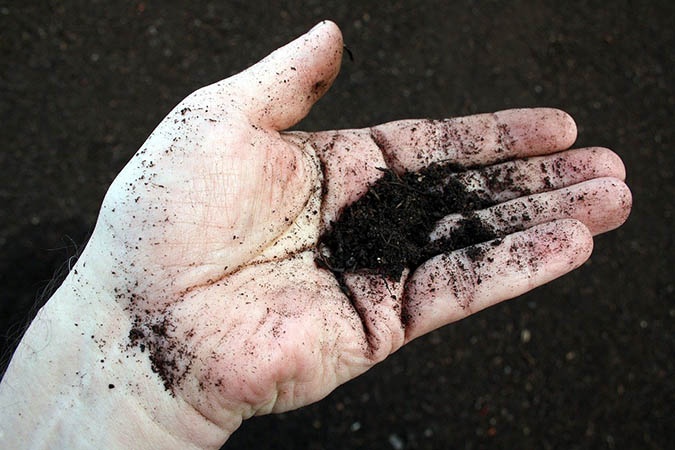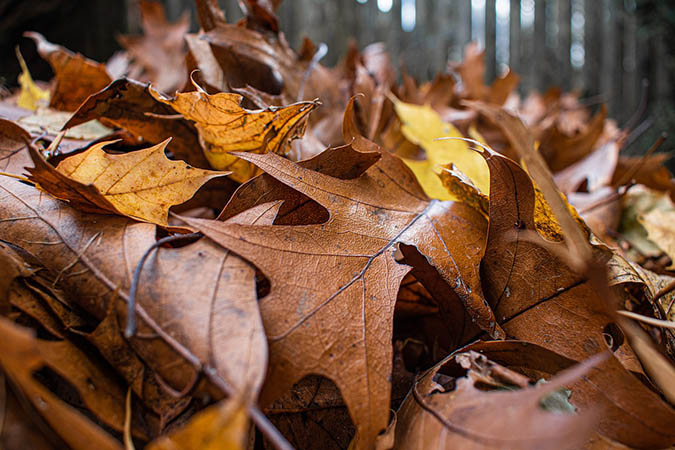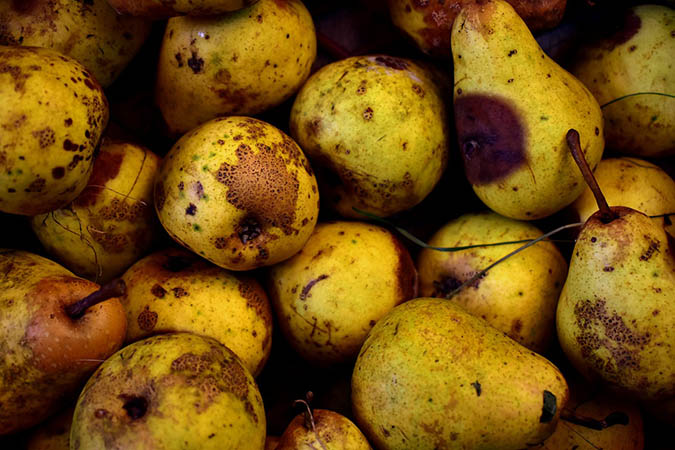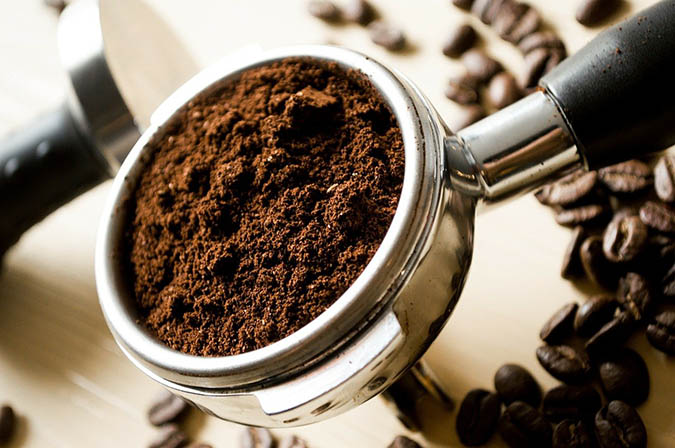Help your compost break down faster with one of these 5 free, DIY compost activators—and you’ll quickly end up with black gold!

Compost Activators: Get Better Compost in Less Time
Did you ever notice that some things compost beautifully, while other things bog down your bins? I try to keep an eye out for the exceptionally good compost activators that I come across. These can be very handy if you keep big compost piles, because they help your compost heat up and finish faster.
You May Also Enjoy:
“Nature Is an EXTREME Composter—You Can Be Too!”
To be totally honest, some of the best things I’ve found aren’t actually free. I keep a bag of cottonseed meal fertilizer on hand just so that I can kick a slow pile of compost into gear, or finish a pile up quickly for an upcoming planting.
But you don’t have to spend any money at all if you don’t want to. Here are 5 compost activators that are free for the asking (if you ask the right person).
5 Free, DIY Compost Activators
A quick word of warning: if you’re using compost tumblers and putting in mostly fresh kitchen scraps, these nitrogen boosters are probably not a good idea for your tumblers. It’s more likely that a nice carbon source like dry leaves or shredded paper would speed your compost up.
The following 5 compost boosters are nitrogen sources, which are intended for people who have big piles of compost with dead leaves from the yard, dead weeds, etc.
Compost Activator #1—Yard Waste

Just a couple of weeks ago, I scored 4 full paper yard waste bags. All it took was asking my neighbor down the street one simple question: “Hey, are you going to get rid of those”? He was confused for a split second, standing there with two arms wrapped around a full bag, probably thinking, “What the heck else am I going to do with this huge bag of trash”?
But he knows I’m a plant nerd and an avid gardener, so it didn’t take him too long to figure it out. He helped me carry the bags to the compost pile in my backyard, instead of carrying them up to the curb in front of his house. In the end, he seemed happy that his yard waste didn’t go to waste.
You May Also Enjoy:
“5 Things You Should Never Feed Worms”
I will confess that I’m a tiny bit picky about what goes in the piles. I love thin, papery things like tall grass clippings, annual weeds, etc. And I try to avoid thick, heavy, waxy leaves like hollies and privet. One time I ended up with two huge bags of live oak leaves and those suckers hung around in my compost piles forever—even after I used a lawn mower to break them up in to smaller pieces.
This time around, I struck gold—4 big bags mostly full of clover, cleavers, grass clippings, and dried elm leaves.
Compost Booster #2—Supermarket Waste

Some grocery stores will give you their past-date produce if you ask for it, but not all stores will go along with this. I’ve heard that some big chains have policies that say their employees can’t give away old produce, probably because of the legal liability that someone could get sick from eating it. So, you might have the best success asking at independent local markets and small regional chains.
You May Also Enjoy:
“The One Thing You Need to Know About Compost Piles”
“5 Inexpensive, Simple Solutions For Small-Space Composting”
A word to the wise: for this approach, try to strike up a casual friendship with the employees in the produce section. Chat them up and get to know them a bit, if you can. If you casually mention that you make a lot of compost, and that you would love to put that old wilted lettuce in it, you’ll have a better chance than if you ask the manager at the service desk.
There’s likely a regular day and time when they throw the old produce out to make room for the new stuff. So, work your charm a little and find out what day that is.
Compost Booster #3—Coffee Grounds

Just walk in to any coffee shop and ask nicely. I’ve been able to get spent coffee grounds from big national chains and from local shops—in the city and in the suburbs. Some people will probably get mad at me for mentioning this because they think I’m telling everyone about their secret stash. But in most places there are more than enough grounds to go around.
You May Also Enjoy:
“19 Uses for Spent Coffee Grounds in Your Home and Garden”
“Aerobic Compost Tea, Worm Tea, and Leachate—A Clarification”
I’ve personally never been told “No, you can’t have any grounds.” One time I walked into a Starbucks right as someone else was walking out the front door with 2 buckets full of grounds. When I asked if there were any more grounds, the barista told me to come back in a couple of hours—no big deal.
Get better soil (and bigger, more nutritious harvests) with the information in our Compost and Soil Fertility Toolkit! Click here to Name Your Own Price!
Definitely bring your own bucket for this trip, because the coffee house will probably give you the grounds in a big trash bag, and they will definitely be sloppy. We have a nice agreement with a coffee shop in our neighborhood where we drop off a clean, empty 5 gallon bucket in the morning, and we pick it up full of grounds later the same day.
Compost Booster #4—Hair

Some people might flinch at the idea of composting hair from strangers for their vegetable garden, but the crafty composter can find some big payloads at the neighborhood hair salon or barbershop. Just look at the floor next time you’re in there—it’s covered with so much hair that they have to keep sweeping it constantly.
You May Also Enjoy:
“Homemade Liquid Fertilizer: The Easy Way to Feed a Large Garden”
“How to Improve Your Terrible Soil”
“Sheet Mulching: Build Soil, Thwart Weeds, and Make Your Garden Fertile”
You might run in to some different rules and regulations depending on where you live and whom you ask. Several years ago, I heard about a barber in another country who was facing legal action because he was composting hair—the hair was regulated as commercial waste, and needed to be discarded in a government-approved receptacle.
But I know that some local shops will set hair aside for you if you ask for it. If there’s a pet grooming service in your neighborhood, that would be worth a try, as well.
Compost Booster #5—Urine

This one will be a little easier for the fellas—but with a jar or bottle, anyone can contribute their “spare nitrogen” to the compost pile. If you host a barbecue or an informal party, put a little sign in the bathroom and ask if the guys wouldn’t mind peeing on the compost pile instead. They can contribute if they’re comfortable with it.
You May Also Enjoy:
“Make Peace With Your Poop (and Then Make Compost With It!)”
Of course, most people will pee more (and be more likely to pee on your compost pile for you) after they’ve had a drink or two!
You could even set up a little screen in front of the pile so that anyone with “stage fright” won’t be too worried about peeing in front of a crowd . . . .
Keeping It Clean
There are potentially problems with all of these free compost ingredients—and that’s where your better judgment will need to kick in. I’ll give you a few examples of what I’m talking about:
If my neighbor had the most lush, pristine yard in the neighborhood, I might suspect that he was using lots of synthetic chemicals, and I would probably pass on his grass clippings.
Likewise, I’d prefer to get past-date produce from the organic aisle of a local market, rather than the conventional aisle of a major chain.
And I’d rather take hair clippings from a humble barber shop than from a posh salon.
If I knew that one of my friends was taking 15 prescription drugs, I definitely wouldn’t ask him to pee on my compost.
You May Also Enjoy:
“Turn Your Weeds Into Fertilizer!”
Trust your instincts, and don’t compost things that you think are too toxic to use in your veggie garden compost. But also trust the composting process to break down some of those nasty items and return them safely to nature. There’s an entire microscopic food chain playing out in your compost pile, and many things will be completely broken down and returned to the garden as healthy nutrients for your plants.
When I’m in doubt, I throw the compostables that I don’t want in my veggie garden into a separate pile that is only used for ornamental plants around the landscape.
What Do You Think?
What do you use to give your compost a jump-start? Let us know in the comments below!
_________________
This is an updated version of an article that was originally published on May 3, 2016. The author may not currently be available to respond to comments, however we encourage our Community members to chime in to share their experiences and answer questions!
The Grow Network is a participant in the Amazon Services LLC Associates Program, an affiliate program designed to provide a means for our team to earn fees for recommending our favorite products! We may earn a small commission, at no additional cost to you, should you purchase an item after clicking one of our links. Thanks for supporting TGN!

The Grow Network is a global network of people who produce their own food and medicine. We’re the coolest bunch of backyard researchers on Earth! We’re constantly sharing, discovering, and working together to test new paths for sustainable living—while reconnecting with the “old ways” that are slipping away in our modern world. We value soil, water, sunlight, simplicity, sustainability, usefulness, and freedom. We strive to produce, prepare, and preserve our own food and medicine, and we hope you do, too!

I found monkey grass takes forever to compost.
I used to use cotton seed meal to ‘heat up’ my compost pile. Now I’ve thought through the cotton growing process: most commercial cotton is GMO, sprayed by defoliant (maybe glyphosate or 2-4D) at harvest, seeds concentrate chemicals used on the ground; then all that would go into my soil.
I used to use alfalfa meal until I found out it has been approved for the GMO process. Go figure!?!
Vigilance is its own reward! I know that Rudolph Steiner recommended certain herbs for the compost pile. I think the list includes Yarrow, Comfrey, Stinging Nettle and a few others, not necessarily as accelerators but as enhancers for the final nutrient yield and influence. Makes me wonder if any soil scientists have studied Steiner’s formulas and understood the physics behind the formulations. What a wonderful gift Steiner gave the world!
since my comfrey quickly grows out of hand I cut it off a few times and throw it in the compost, seems to work well; alos tried a comfrey compost tea last year – smells like a pile of fresh manure!
I stay far away from other people’s waste!
I’m a bit confused: I have 3 piles that have been there almost a year and I’m wondering if I need to keep adding waste from the kitchen how am I supposed to get finished compost without starting 20 different piles so some get left alone?
Keri, I use three bin for my compost. When the first bin is filled, I use the middle bin to turn the pile into. I will turn the first pile about once a week and sprinkle with water to maintain a moist consistency. The third bin can then be filled as the first bin is processing. You might consider combining two of your piles. Turn and water, as often as you’re comfortable with. When it is almost finished, cover with a tarp for a week or two to finish it off. Your third pile can be used to add waste until the first pile is complete. As you start using up the first pile, finish the working pile. Combine the two finished piles and start on a new one.
i wish i had room for 3 bins, one of my dreams!
so i just fill one and when it has sunken “enough” i put the top into my wheelbarrow, get to the soil on the bottom and then put all the stuff that needs more time back as the bottom layer and pile new stuff on top.
I’ve heard the saying before that a market downturn will detect cases of fraud that auditors never even suspect. On the corynart, I suspect many a fraudster will use the downturn as his cover story for where all the money went: “Ooops, I had it all in Citigroup and GM, who couldda’ known?”
What has this pot to do with composting?
I hear you kris.Take heart though – there is absolutely NO CHANCE that bill will survive a Charter challenge. Sure, the Tories are wasting taxpayers money, yet again, for their stupid, small minded, petty politics, but when has that ever stopped them. Thank god (and Trudeau) for the Constitution!Gayle
does this have anything at all to do with composting?
I found just what I was needed, and it was entrateining!
Anything derived from cotton seed should be suspect for a vegetable garden. Think about all the herbicides and pesticides used in cotton farming.
what about onions? some people say not to use them others swear by them?
Keri, I’ve been making compost for many years, I use dry chicken manure sprinkled into the compost to kick start it, a bean can full is enough. When I have a bin full of prepared waste I compress it with a 3mm thick sheet of rigid plastic with a few bricks on top. If the mix is fairly even, half greens like grass cuttings, and half brown like dry leaves the pile might reach 60C within a day or two. The bigger the bin the more successful the decomposition, I have three one cubic meter bins
We had a double (concrete block sides — dirt floor) compost pit with removable boards in the center about 5X5X4 deep each side. Weeds did NOT go into the compost pit. Everything from garden clean-up went through the chipper/shredder into the compost pit including small branches. The chipper/shredder cuts compost time way down. When one side was almost full we would put new stuff in the empty side and then flip the older compost over the new. The old at the bottom would be totally composted and ready to use in the garden. Keep it moist for worms. I also found that orange and grapefruit peels make it too acid and not good for plants or worms so you have to watch what you put into your compost. We now have our own goats, chickens and rabbits for manure to add to the garden.
I live on 200 acres in the Rockies. Every raccoon, deer, bear and skunk for miles showed up at my garden and compost pile, no matter that I had a big dog. Hair clippings and urine were the answer. The human males in the household were encouraged to pee around the outside fence. Hair clippings helped as well. Now my garden is “marked” exactly the way all other meat eating predators mark their territory. (Human urine tells animals that we are predators.) I added a motion activated sprinkler but haven’t needed to use it often. So in addition to their value in compost, those two items help with pest control. For anyone who is concerned: unlike feces, urine is sterile when it exits the body and breaks down quickly, so you don’t have the issues you would have with sludge. Just don’t get it on the actual veggies. Let the microbes chomp on it in the compost first, or mark the perimeter a little distance from the veggies. You won’t smell it.
Hi – We do this at my house too. We add urine directly to the compost pile when the pile is new, and then stop a few weeks before we harvest the pile (I’ve read that urine is actually not sterile). And we use urine to draw a perimeter around the piles too. Seems to work pretty well!
Having worked in and taught medical microbiology I feel competent in answering the comment urine is not sterile. I probably did a 100,000 urine cultures and yes it is sterile if the patient does not have a urinary track infection. There may be normal flora fron the urinary canal but not pathogens.
Help, I’m certainly not a very experienced composter, but I do have a compost barrel that we mostly put throw away veggies and the like. Right now I have a fully ripe and very very large mulberry tree leaving a ton more mulberries that I can gather or use, all over my patio, yard, back sidewalk etc. they are fermenting or will soon. Can I put them in my compost? Do I need a separate compost? Could I offer them to someone who would love to have them?! I have no idea. Thanks for any help you may suggest.
Help, I’m certainly not a very experienced composter, but I do have a compost barrel that we mostly put throw away veggies and the like. Right now I have a fully ripe and very very large mulberry tree leaving a ton more mulberries that I can gather or use all over my patio, yard, back sidewalk etc. they are fermenting or will soon. Can I put them in my compost? Do I need a separate compost? Could I offer them to someone who would love to have them?! I have no idea. Thanks for any help you may suggest.
[ We have a nice agreement with a coffee shop in our neighborhood where we drop off a clean empty 5 gallon bucket in the morning, and we pick it up full of grounds later the same day. ]
That is exactly what I do!
I get tea leaves and coffee grounds 6 days a week. I have to sieve the coffee grounds from the tea leaves/powder and only use then in containers because if left in a pile on the ground they attract termites which are troublesome to exterminate.
I am one of those that get coffee grounds from Starbucks.
I used to NOT put onions, garlic, orange peel, hair, and never peed in my compost, but now I put all the above (except the pee lol) in my compost. It all works. And I LOVE my compost. Not only does it make the foods grow exponetionally but the random seeds that survive the composting process; mainly tomato & squash come up and give me the BEST fruits of all. We have no soil in our zone on the Big Island and for 6 years I have been cutting & dropping and composting stuff into soil. I now have almost a foot deep with virtually no added soil. I couldn’t do it without compost AND I have less trips to the garbage dump!
One idea for a compost accelerator is old fertilizer. If you find an old package of fertilizer in your shed that you’re not sure if it’s any good you can toss it in to your compost pile and any nitrogen it has in it will help to accelerate the compost breakdown. I would add small amounts of old fertilizer not a 20 lb. bag all at once just so you don’t overwhelm the system.